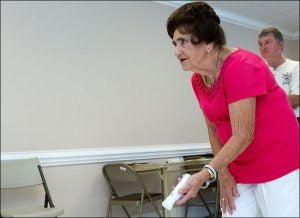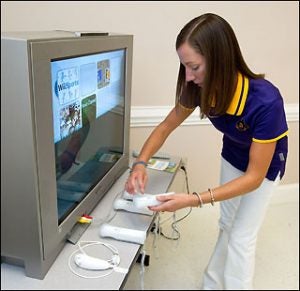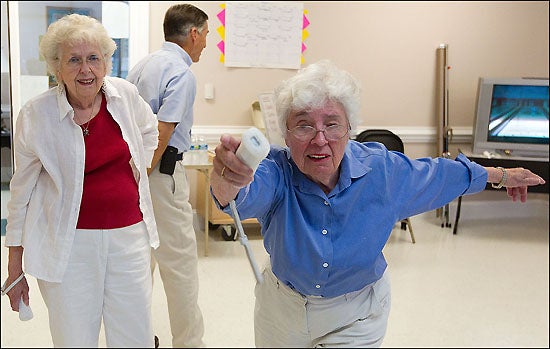Wii are Fit: Study Helps Seniors Stay on their Feet
Swinging her arm back, Claudine Humphrey releases the ball down the alley toward the pins. She’s bowling again. But this time it’s different.
Humphrey is one of 15 seniors who play video games using a Nintendo Wii as part of research conducted at East Carolina University by Whitney Sauter, graduate student in the Recreation and Leisure Studies Department, College of Health and Human Performance.
The study looks at how interactive video-gaming exercise, also called “exergaming,” can improve balance, prevent falls and maintaining planned activity involvement.

An 85-year-old former league bowler, Claudine Humphrey enjoys Nintendo Wii bowling as part of an ECU study on the effects of video gaming on balance and fall prevention at the Pitt County Senior Center. Participant Bill Hill is shown behind Humphrey.
According to statistics from the Centers for Disease Control and Prevention, falls are the leading cause of injury-related deaths in older adults over 65 years of age. A major contributor of falls is balance dysfunction. Falls are also the most frequent cause of nonfatal injuries and inpatient hospital admissions.
“It has been years since I bowled,” said Humphrey, 85. As a former deputy civilian personnel officer for the secretary of the Army at the Pentagon, she and her husband used to bowl on church leagues at Fort Belvoir Military base.
Participants in the study meet weekly at the Pitt County Senior Center and their age ranges from 62 to 91.
Humphrey said she was hesitant about participating in the study at first. Now, she said she loves playing Wii and can see some improvement.
“I have noticed that the stretching exercises for the ankles have made a difference when I work in my garden at home,” said Humphrey.”
Sessions begin with low-intensity stretching exercises and target maintaining or improving functional skills that reduce the risk of falls such as dynamic standing, weight-shifting, stepping, and reaching.
“I have not missed a class and I recommend this game to others.” Humphrey said.
Sauter said connecting seniors with Wii was a natural fit.
“I chose Nintendo Wii sports game package for this intervention because it allows seniors to engage in simulated sports that they could have enjoyed in the past but may be physically unable to do so in a real-world environment,” she said.
She said the participating seniors have little difficulty operating their Wii remotes and quickly learned which buttons to press to play in the virtual environment.
The two most popular video games are bowling and golfing.
During a recent session, Dr. Parmalee Hawk, retired director of teacher education and former associate dean in the College of Education at ECU, bowled several spares, then threw a power ball taking out all the pins.

ECU graduate student Whitney Sauter (Recreation and Leisure Studies) prepares Nintendo Wii controllers for the seniors who use the equipment to play virtual games like bowling and golf.
“I knew there was a strike in there somewhere,” Hawk said. “I am ending this game with a bang.”
Along with physical and cognitive benefits gained from this intervention, Sauter has also noticed social benefits. Seniors have been able to foster healthy inner-competitiveness and demonstrate motivation to beat or maintain their personal high score from week to week.
“I like how the Wii gives you the opportunity to move the ball to the left or the right to align it with the pins,” said William Hill, 62. Hill is retired from NACCO Materials Handling Group and says this game is ideal for those who can’t go to the gym.
Sauter works part-time as a therapeutic recreation specialist at Pitt County Memorial Hospital’s Regional Rehabilitation Center. She will graduate in December with a Master of Science degree in recreational therapy administration.
